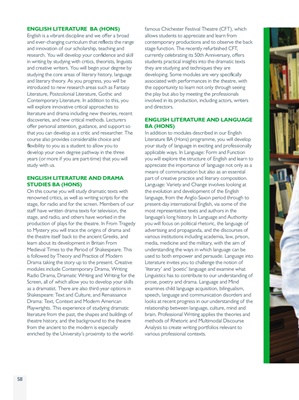
ENGLISH LITERATURE BA (HONS)
English is a vibrant discipline and we offer a broad
and ever-changing curriculum that reflects the range
and innovation of our scholarship, teaching and
research. You will develop your confidence and skill
in writing by studying with critics, theorists, linguists
and creative writers. You will begin your degree by
studying the core areas of literary history, language
and literary theory. As you progress, you will be
introduced to new research areas such as Fantasy
Literature, Postcolonial Literature, Gothic and
Contemporary Literature. In addition to this, you
will explore innovative critical approaches to
literature and drama including new theories, recent
discoveries, and new critical methods. Lecturers
offer personal attention, guidance, and support so
that you can develop as a critic and researcher. The
course also provides considerable choice and
flexibility to you as a student to allow you to
develop your own degree pathway in the three
years (or more if you are part-time) that you will
study with us.
ENGLISH LITERATURE AND DRAMA
STUDIES BA (HONS)
On this course you will study dramatic texts with
renowned critics, as well as writing scripts for the
stage, for radio and for the screen. Members of our
staff have written drama texts for television, the
stage, and radio, and others have worked in the
production of plays for the theatre. In From Tragedy
to Mystery you will trace the origins of drama and
the theatre itself back to the ancient Greeks, and
learn about its development in Britain From
Medieval Times to the Period of Shakespeare. This
is followed by Theory and Practice of Modern
Drama taking the story up to the present. Creative
modules include Contemporary Drama, Writing
Radio Drama, Dramatic Writing and Writing for the
Screen, all of which allow you to develop your skills
as a dramatist. There are also third-year options in
Shakespeare: Text and Culture, and Renaissance
Drama: Text, Context and Modern American
Playwrights. This experience of studying dramatic
literature from the past, the shapes and buildings of
theatre history, and the background to the theatre
from the ancient to the modern is especially
enriched by the University's proximity to the worldfamous
Chichester Festival Theatre (CFT), which
allows students to appreciate and learn from
contemporary productions and to observe the back
stage function. The recently refurbished CFT,
currently celebrating its 50th Anniversary, offers
students practical insights into the dramatic texts
they are studying and techniques they are
developing. Some modules are very specifically
associated with performances in the theatre, with
the opportunity to learn not only through seeing
the play but also by meeting the professionals
involved in its production, including actors, writers
and directors.
ENGLISH LITERATURE AND LANGUAGE
BA (HONS)
In addition to modules described in our English
Literature BA (Hons) programme, you will develop
your study of language in exciting and professionally
applicable ways. In Language: Form and Function
you will explore the structure of English and learn to
appreciate the importance of language not only as a
means of communication but also as an essential
part of creative practice and literary composition.
Language: Variety and Change involves looking at
the evolution and development of the English
language, from the Anglo-Saxon period through to
present-day international English, via some of the
most representative texts and authors in the
language's long history. In Language and Authority
you will focus on political rhetoric, the language of
advertising and propaganda, and the discourses of
various institutions including academia, law, prison,
media, medicine and the military, with the aim of
understanding the ways in which language can be
used to both empower and persuade. Language into
Literature invites you to challenge the notion of
'literary' and 'poetic' language and examine what
Linguistics has to contribute to our understanding of
prose, poetry and drama. Language and Mind
examines child language acquisition, bilingualism,
speech, language and communication disorders and
looks at recent progress in our understanding of the
relationship between language, culture, mind and
brain. Professional Writing applies the theories and
methods of Rhetoric and Multimodal Discourse
Analysis to create writing portfolios relevant to
various professional contexts.